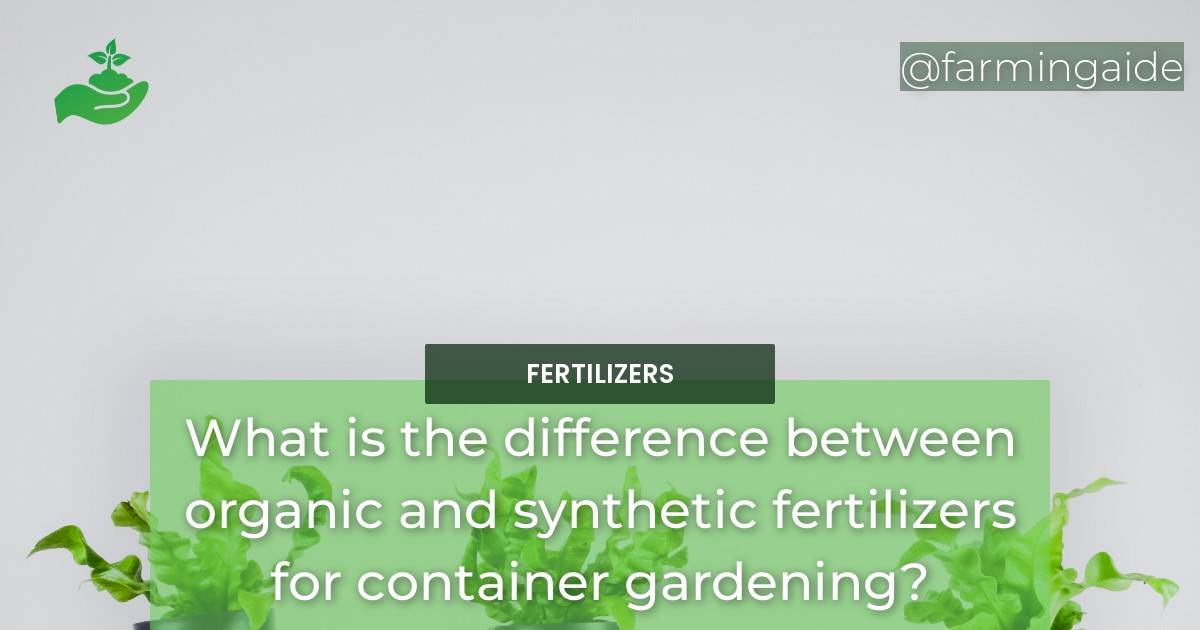Container gardening is a sustainable way of growing plants, flowers, and vegetables in small spaces. One important aspect of container gardening is the use of fertilizers, which can either be organic or synthetic. Understanding the difference between the two types of fertilizers is crucial in selecting the best option for your container garden.
Definition and Characteristics of Organic Fertilizers
Definition of Organic Fertilizers
Organic fertilizers are derived from animal waste, plant matter, and other natural sources. They contain a variety of nutrients, including nitrogen, phosphorus, and potassium, along with other essential nutrients such as calcium, magnesium, and sulfur.
Characteristics of Organic Fertilizers
Organic fertilizers contain a lower concentration of nutrients than synthetic fertilizers, which means they release nutrients slowly over time. They also improve soil structure and texture, promote soil microbial activity, and increase water retention capacity. Organic fertilizers are environmentally friendly, as they reduce the amount of chemical runoff into water sources and minimize the risk of soil contamination.
Advantages and Disadvantages of Organic Fertilizers
Advantages of Organic Fertilizers
- Slow-release of nutrients, which prevents nutrient leaching and runoff
- Improves soil structure and texture
- Increases soil microbial activity
- Reduces the risk of soil contamination
- Environmentally friendly
Disadvantages of Organic Fertilizers
- Lower nutrient concentration than synthetic fertilizers
- Nutrient availability dependent on temperature and moisture levels
- May contain pathogens or weed seeds
- Can be more expensive compared to synthetic fertilizers
ALSO READ
Definition and Characteristics of Synthetic Fertilizers
Definition of Synthetic Fertilizers
Synthetic fertilizers are made from chemical compounds that are not found in nature. They contain high concentrations of nutrients, including nitrogen, phosphorus, and potassium.
Characteristics of Synthetic Fertilizers
Synthetic fertilizers are water-soluble and provide an immediate burst of nutrients to plants. They are easy to apply and are usually less expensive compared to organic fertilizers. However, synthetic fertilizers do not improve soil structure and texture and do not promote soil microbial activity. Overuse of synthetic fertilizers can also lead to soil pollution and environmental damage.
Pros and Cons of Synthetic Fertilizers
Pros of Synthetic Fertilizers
- High nutrient concentration
- Immediate release of nutrients
- Less expensive compared to organic fertilizers
- Easy to apply
Cons of Synthetic Fertilizers
- Can lead to soil pollution and environmental damage
- Do not improve soil structure and texture
- Do not promote soil microbial activity
- Can burn plant roots if applied in excess
Choosing the Best Fertilizer for Container Gardening
Factors to Consider
When choosing between organic and synthetic fertilizers for container gardening, consider the following factors:
- Plant type and nutrient requirements
- Soil type and pH level
- Climate and weather conditions
- Budget and availability
Recommendations for Organic and Synthetic Fertilizers
For container gardening, a combination of both organic and synthetic fertilizers is recommended. Organic fertilizers provide long-lasting soil improvement and slow-release nutrients, while synthetic fertilizers provide an immediate boost of nutrients. A 1:1 ratio of organic to synthetic fertilizers is a good starting point, but the ratio may vary depending on plant type and nutrient requirements.
Application and Usage of Fertilizers for Container Gardening
Tips for Proper Application of Fertilizers
- Follow package instructions for application rates
- Avoid applying fertilizers to dry soil
- Water plants thoroughly after fertilizing
- Apply fertilizers evenly and avoid over-application
Common Mistakes to Avoid when Using Fertilizers
- Overuse of fertilizers, which can lead to nutrient burn or soil pollution
- Applying fertilizers to dry or waterlogged soil
- Applying fertilizers too frequently or not frequently enough
Conclusion
Organic and synthetic fertilizers both have advantages and disadvantages when used in container gardening. The best option is a combination of both types, which provides slow-release nutrients and long-term soil improvement while also providing an immediate boost of nutrients when needed. Proper application and usage of fertilizers are crucial in achieving optimal plant growth and avoiding soil pollution or damage.
RELATED ARTICLES:


